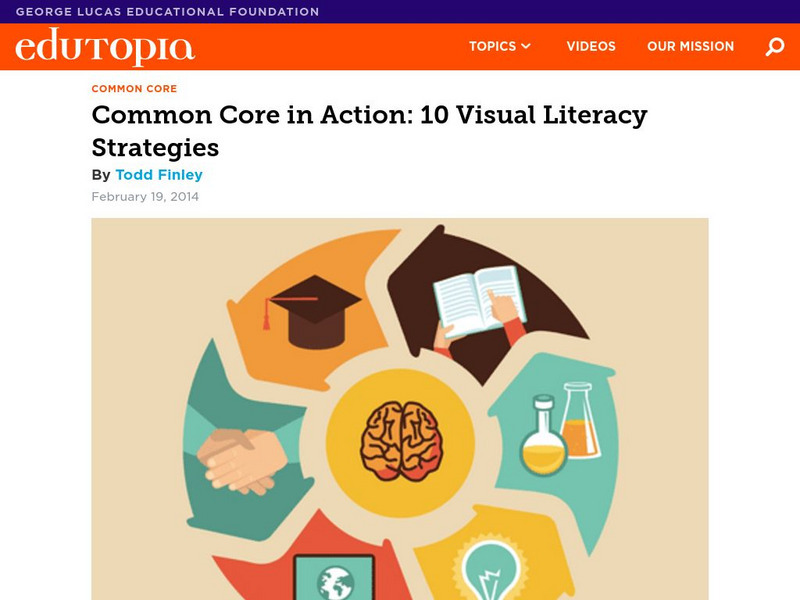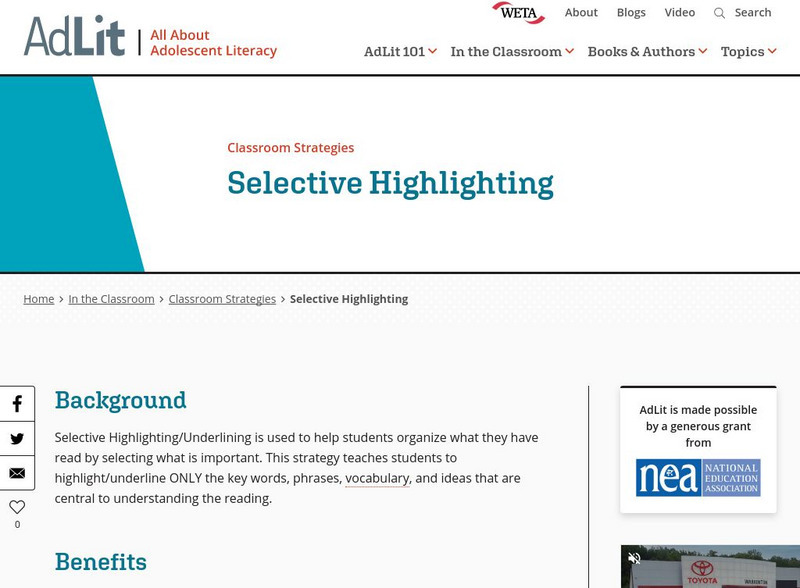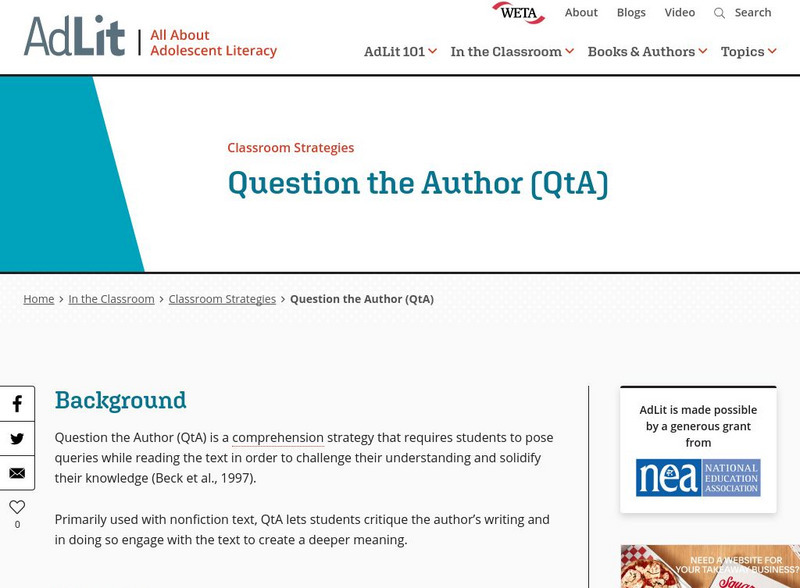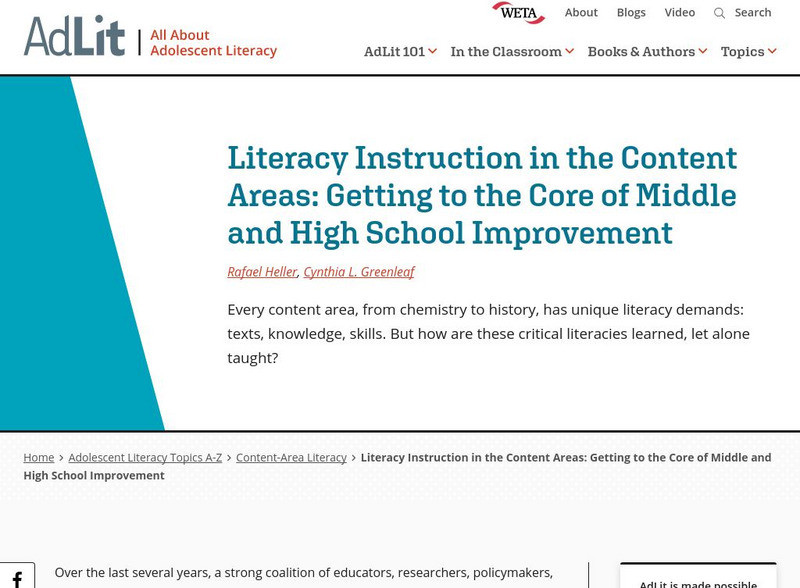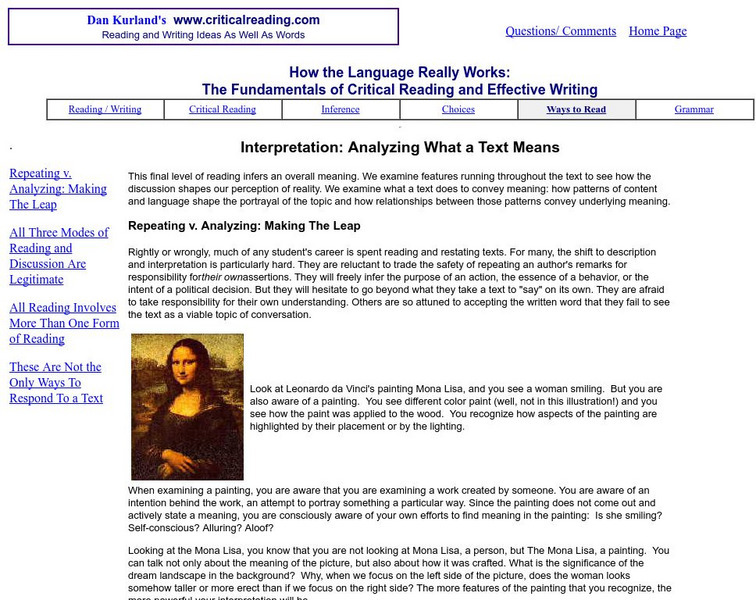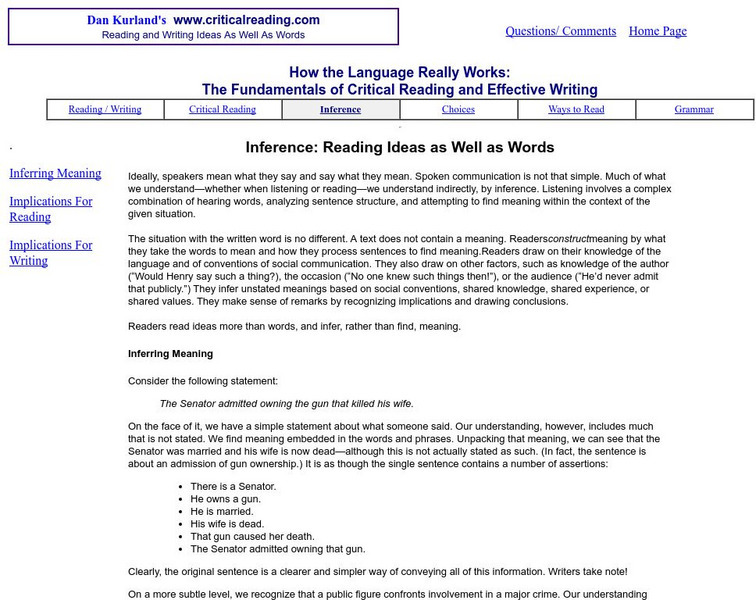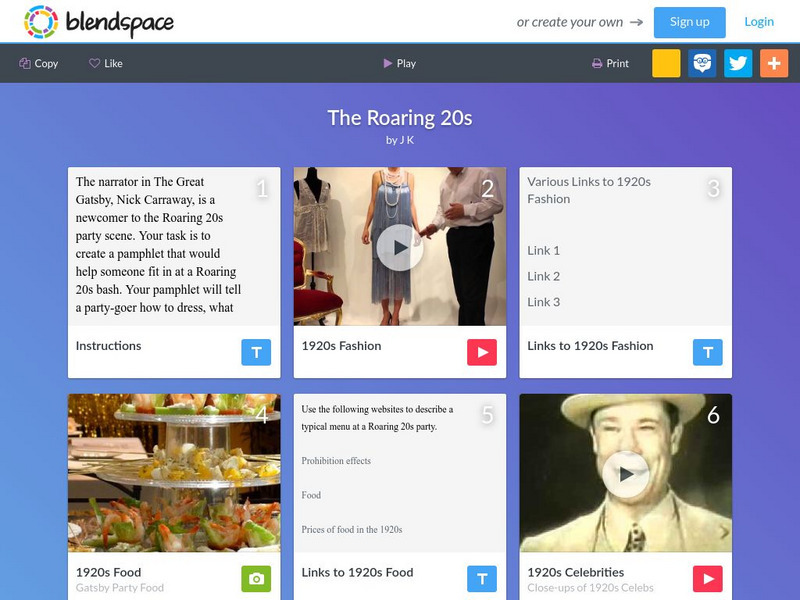Hi, what do you want to do?
Wisc-Online
Wisc Online: Summary Writing
In this learning module, students demonstrate an understanding of summary writing by reading step-by-step instructions and then summarizing short paragraphs. Examples of summaries that are poorly written, as well as those that are...
BBC
Bbc Skillswise: Reading and Understanding
Tips on how to check understanding of text for adult learnings.
Edutopia
Edutopia: Common Core in Action: 10 Visual Literacy Strategies
Explicitly teach a collection of competencies that will help students think through, think about, and think with pictures.
Khan Academy
Khan Academy: Match Principles Learn More
How do you match the principles of two arguments or situations? "Match principles" questions are similar to match structure questions in that the passage represents an argument or a situation, and each choice also represents an argument...
Khan Academy
Khan Academy: Strongly Supported Inferences Quick Guide
A quick guide to approaching questions that ask you to identify something that is "strongly supported." On questions that ask you to find the choice that is most strongly supported by a stimulus, the answer does not have to be...
Khan Academy
Khan Academy: Strongly Supported Inferences Learn More
How do we recognize what is "strongly supported?" Some questions on the logical reasoning section of the LSAT ask what additional information is supported by a stimulus. These are similar to questions that ask you to identify the...
Khan Academy
Khan Academy: The Sat Reading Test: Information and Ideas
The Information and Ideas category of the SAT Reading Test includes questions that focus on what the passage says (directly or indirectly). To interpret the author's message, you'll need to consider both what's stated and what's implied...
Khan Academy
Khan Academy: Applying to New Contexts Quick Guide
Some questions ask you to identify which scenario matches the principle in a passage. This type of question asks you to apply a principle or idea presented in the passage to a new context presented in the choices.
Louisiana Department of Education
Louisiana Doe: Louisiana Believes: English Language Arts, Grade 9: Hope, Despair, and Memory
This unit teaches young scholars about the importance of hope and remembrance during times of tragedy. Students explore the different ways characters and historical figures have embraced humanity and created civility as a response to...
Louisiana Department of Education
Louisiana Doe: Louisiana Believes: Ela Guidebooks: Accountable Talk
This strategy helps students refine their understanding of texts to meet reading expectations, engage in group conversations to meet speaking and listening expectations, and prepare for writing about texts.
Louisiana Department of Education
Louisiana Doe: Louisiana Believes: English Language Arts, Grade 9: Fahrenheit 451
Students explore the power of written language to educate and influence others. They read various argumentative essays and engage in virtual collaboration to develop their own arguments. They also research a self-generated question...
Joe Landsberger
Study Guides & Strategies: How to Read an Essay
Use this guide when reading an expository text or any type of essay, as it provides important questions you should ask yourself while you read. You can access this page in multiple languages from the English homepage.
AdLit
Ad lit.org: Classroom Strategies: Selective Highlighting
Selective Highlighting/Underlining is used to help students organize what they have read by selecting what is important. This strategy teaches students to highlight/underline ONLY the key words, phrases, vocabulary, and ideas that are...
AdLit
Ad lit.org: Classroom Strategies: Question the Author (Qt A)
Question the Author (QtA) is a comprehension strategy that requires students to pose queries while reading the text in order to challenge their understanding and solidify their knowledge (Beck et al., 1997).
AdLit
Ad lit.org: Multiple Texts: Multiple Opportunities for Teaching and Learning
Engaging all students in a themed study or unit is a challenge that teachers can resolve by using materials that match students' independent or instructional reading levels (Robb 1994, 2000). When students face textbooks that are above...
AdLit
Ad lit.org: Literacy Instruction in the Content Areas: The Core of Improvement
Every content area, from chemistry to history, has unique literacy demands: texts, knowledge, skills. But how are these critical literacies learned, let alone taught?
Other
Noodle Tools: Basic Language Literacy: Writing: Paragraph Art
When you create a coherent paragraph, it can be represented by any number of visual images. This page shows examples of how that might work to help writers understand the idea of coherence.
Other
How the Language Really Works: Restatement
Choosing when to read for simple comprehension is the focus of this brief article.
Other
Critical Reading: How the Language Really Works: Interpretation
In this brief article, the author considers the ways that readers interpret text. An interesting comparison between reading and viewing a painting is worth a look.
Other
Gallaudet University: Reading and Mapping
Learn strategies for reading and mapping. This link offers important tips on improving test taking skills. Includes a PDF (requires Adobe Reader).
Other
Strategies for Reading Comprehension:reciprocal Teaching
Use this page to understand the reciprocal teaching strategy that includes the role of the clarifier in student groups.
Other
Daniel J. Kurland: Critical Reading: Inference: Reading Ideas as Well as Words
This college instructor offers his insights into critical reading and how to develop skills to interpret as well as comprehend the written word. RL.9-10.1, RL.11-12.1, RI.9-10.1 textual evidence and inference.
TES Global
Blendspace: The Roaring 20's
A learning module with thirteen links to texts, images, and videos, with information about life during the 1920's. RI.9-10.7 different mediums
Other
Laflemm.com: Reading Resources: Inference
This page has reading tips and exercises that explain inferences. There is an answer key for students to check their work. RL.9-10.1, RL.11-12.1, RI.9-10.1 & RL.11-12.1 textual evidence and inferences







